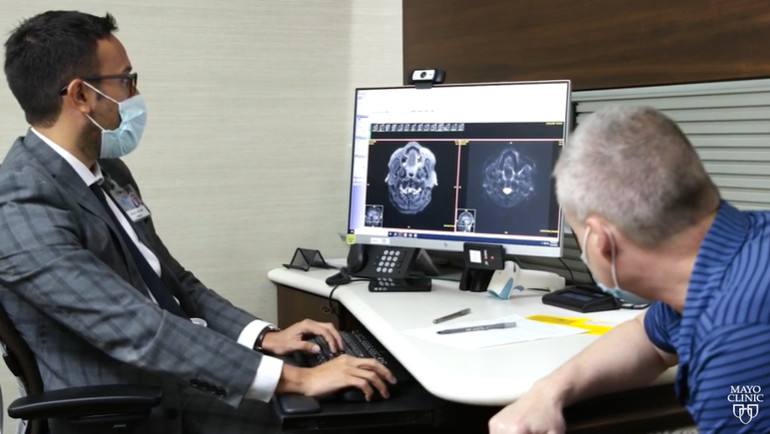
A team of scientists from Mayo Clinic and two other institutions published a study in 2019 that showed the existence of an autoimmune disorder that affects men. The disorder causes the immune system to attack the brain, causing severe neurologic symptoms.
That's what happened to a Florida man, and his search for answers led him to experts at Mayo Clinic.
Reporter Jason Howland has his story.
Watch: Unique neurologic symptoms lead to surprising cancer diagnosis.
Journalists: Broadcast-quality video (2:42) is in the downloads at the end of this post. Please courtesy: "Mayo Clinic News Network." Read the script.
It started with some lightheadedness, loss of balance, vision changes and abnormal eye movements.
"I could be looking at somebody and my eyes are going all over the place," says Gregor Heinrich of Boca Raton, Florida. "It's kind of like you're getting off a merry-go-round, and things are moving all the time."
The 59-year-old knew something wasn't right, so he saw his local doctor.
"And he said, 'I think it's MS, but if it's not MS, we'll probably treat it as MS.' So I wasn't satisfied with that answer," Gregor says.
For more than six months, he searched for second opinions and still no answers.
"I thought maybe it was an ear crystal. I went to a physical therapist. I went to a heart doctor, probably four or five other doctors, and nobody could figure out what was going on," Gregor says.
Eventually, his bloodwork was sent to a special specialized neuroimmunology laboratory at Mayo Clinic in Rochester, Minnesota, for analysis. He then was referred to Dr. Sebastian Lopez, a neurologist at Mayo Clinic in Florida.
"When I first met Dr. Lopez, I remember him coming in the room and said, 'Well, we know what you have,'" Gregor says.
Surprisingly, it was testicular cancer.
"It's probably the last thing you would ever expect to hear," Gregor says.
"When a patient comes in to see a neurologist, they don't expect to be diagnosed with malignancies. But the clinical presentation, the inflammatory findings in the spinal fluid, in addition to the biomarker, the Kelch-11 antibody, was all very helpful to help us narrow down to diagnosis," says Dr. Lopez.
"It was malignant seminoma testicular cancer," Gregor says.
A cancerous tumor near Gregor's spine was creating an abnormal immune response in his nervous system, known as paraneoplastic encephalitis.
"In these rare paraneoplastic disorders, the immune system causes an inflammatory process that leads to neurologic dysfunction," says Dr. Lopez.
"Had it not been for these neurological issues, I would have never known that I had cancer," Gregor says.
The tumor, roughly the size of an egg, was removed on Dec. 12, 2019, at Dr. Lopez's recommendation even though two previous biopsies indicated that the tumor appeared to be benign.
"Fortunately, it was extremely close, by millimeters. It wasn't touching any other organs, and they were able to extract it," Gregor says.
Once a biopsy was conducted on the removed tumor, it reflected that it was actually malignant. Tests were done to locate the cancer source, and surgery to remove the cancer-causing testicle was conducted on Jan. 06, 2020.
Gregor started cancer treatment on Jan. 20, 2020.
"Had this gone untreated for some amount of time, additional, it would have easily spread and caused, certainly, issues that could have resulted in death or much worse conditions," Gregor says.
Today, Gregor is on the road to recovery. Those symptoms that provided the initial clues to his cancer still linger, but they have improved.
"It's a blessing in a way. It is blessing that I've had these neurological symptoms that led me to this," he says.
____________________________________
For the safety of its patients, staff and visitors, Mayo Clinic has strict masking policies in place. Anyone shown without a mask was recorded prior to COVID-19 or recorded in an area not designated for patient care, where social distancing and other safety protocols were followed.







